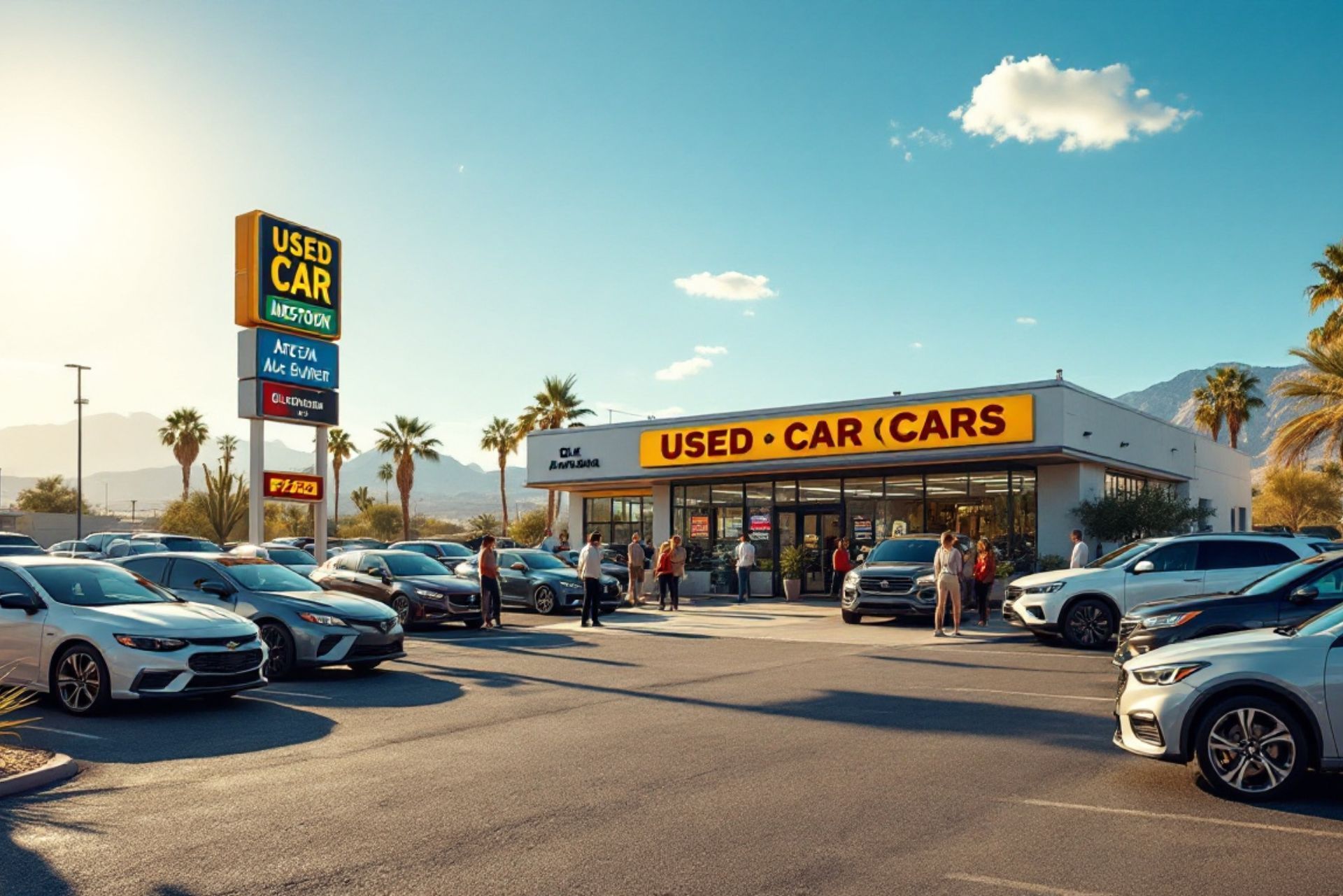Arizona Used Dealerships Insurance
See How We're Different:
or Call Us:(480) 526-3222

Most Common Business Policies
Index
Contact Us
When it comes to purchasing a used vehicle in Arizona, understanding the insurance requirements and options available through dealerships can be a daunting task. This article aims to provide comprehensive information on used dealerships insurance in Arizona, ensuring that potential buyers are well-informed and prepared for their vehicle purchase.
Understanding Used Dealerships in Arizona
Used dealerships in Arizona offer a wide range of vehicles, from certified pre-owned cars to older models at competitive prices. These dealerships often provide financing options, warranties, and various services that can enhance the buying experience. With the state's warm climate, many vehicles tend to have less wear and tear compared to those in harsher environments, making Arizona a great place to shop for used cars.
The Role of Used Dealerships
Used dealerships serve as intermediaries between sellers and buyers, providing a platform for individuals to purchase vehicles with some level of assurance. They typically conduct inspections, provide vehicle history reports, and may offer limited warranties on their cars. This level of service can significantly reduce the risks associated with buying a used vehicle. Furthermore, many dealerships employ knowledgeable staff who can assist customers in understanding the nuances of different models, helping them make informed decisions based on their lifestyle and budget.
Types of Vehicles Available
Arizona used dealerships stock a diverse inventory that caters to different preferences and budgets. From sedans and SUVs to trucks and hybrids, buyers can find vehicles that meet their specific needs. Additionally, many dealerships specialize in certain brands or types of vehicles, which can make the search easier for buyers looking for specific features. For instance, outdoor enthusiasts may find a plethora of rugged trucks and SUVs designed for Arizona's off-road trails, while families might lean towards spacious minivans or crossovers that offer comfort and safety for long drives through the scenic landscapes of the state. The availability of electric and hybrid vehicles is also on the rise, reflecting a growing trend towards eco-friendly options that align with Arizona's commitment to sustainability.

Insurance Requirements for Used Vehicles
In Arizona, vehicle insurance is mandatory for all drivers. Understanding the insurance requirements for used vehicles is crucial for anyone considering a purchase from a dealership.
Mandatory Insurance Coverage
Arizona law requires all drivers to carry liability insurance, which covers damages to other vehicles and medical expenses in the event of an accident. The minimum coverage limits are $15,000 for injury or death of one person, $30,000 for injury or death of multiple people, and $10,000 for property damage. However, these minimums may not be sufficient for all drivers, especially those purchasing higher-value vehicles. It's important to note that Arizona operates under a fault-based system, meaning the driver found at fault in an accident is responsible for covering the costs incurred by the other party. This can lead to significant financial liability if the minimum coverage is not adequate.
Additional Coverage Options
While liability insurance is the minimum requirement, many buyers opt for additional coverage to protect their investment. Comprehensive and collision coverage can help cover damages to the insured vehicle, whether from an accident or other incidents like theft or vandalism. Buyers should evaluate their personal circumstances and the value of the vehicle when deciding on coverage levels. For instance, if a buyer is purchasing a late-model used vehicle, the added expense of comprehensive coverage may be justified, as it can save them from substantial out-of-pocket costs in the event of a total loss. Furthermore, uninsured and underinsured motorist coverage is also advisable, as it provides protection if you're involved in an accident with a driver who lacks sufficient insurance. This type of coverage can be particularly important in Arizona, where the number of uninsured drivers is notably high.
Additionally, many insurance companies offer discounts for various factors that can help lower premiums. These can include safe driving records, bundling policies, or even completing defensive driving courses. It’s wise for buyers to shop around and compare quotes from different insurers, as rates can vary significantly. Understanding these nuances not only helps in complying with state laws but also ensures that drivers are adequately protected on the road, providing peace of mind as they navigate their daily commutes or road trips across the beautiful Arizona landscape.
Choosing the Right Insurance Provider
Selecting the right insurance provider is a critical step in the process of buying a used vehicle. Different companies offer varying rates, coverage options, and customer service experiences. It’s essential to take the time to research and compare these offerings to ensure that you are making an informed decision that aligns with your needs and budget.
Factors to Consider
When choosing an insurance provider, consider factors such as the company's reputation, customer service ratings, and the range of coverage options available. Additionally, obtaining quotes from multiple providers can help identify the best deal for the required coverage. Reading customer reviews and testimonials can provide insight into the experiences of others, revealing how responsive and helpful the company is during claims processing and day-to-day inquiries. Furthermore, it’s wise to check if the provider has a strong financial standing, as this indicates their ability to pay out claims when needed.
Discounts and Savings
Many insurance companies offer discounts that can significantly reduce premiums. These may include multi-policy discounts, safe driver discounts, and discounts for vehicles equipped with safety features. Buyers should inquire about available discounts when shopping for insurance to ensure they are getting the best possible rate. Additionally, some insurers provide incentives for low mileage or for completing defensive driving courses, which can further enhance savings. It’s also beneficial to review the terms of these discounts regularly, as they can change or new ones may become available, allowing you to maximize your savings over time.
Moreover, understanding the nuances of each discount can help you strategize your insurance purchase effectively. For instance, if you are considering bundling your auto insurance with
home or renters insurance, you might save even more than expected. Some companies even offer loyalty discounts for long-term customers, which can be a significant benefit if you plan to stay with the same provider for several years. By being proactive and asking about all possible savings, you can ensure that you're not leaving any money on the table while securing the coverage you need.
Many used dealerships in Arizona offer financing options that can simplify the purchasing process. Understanding how insurance fits into this equation is essential for buyers.
Financing Through the Dealership
Dealerships often provide financing options directly, allowing buyers to secure a loan without going through a bank or credit union. This can streamline the process, but it’s important to read the terms carefully. Some dealerships may require proof of insurance before finalizing the financing agreement. Additionally, dealerships may offer promotional financing rates, especially for certain models or during special sales events. Buyers should inquire about any available incentives that could lower their monthly payments or overall loan costs.
Third-Party Financing
Alternatively, buyers can seek financing from third-party lenders. This option may provide more competitive rates, especially for those with good credit. However, it’s essential to have insurance in place, as lenders typically require proof of coverage before approving a loan. Furthermore, third-party lenders may offer various loan terms, allowing buyers to choose a repayment schedule that best fits their financial situation. It’s advisable to compare multiple offers and consider the total cost of financing, including interest rates and any additional fees, to ensure the best deal.
Understanding Insurance Requirements
When purchasing a vehicle, understanding the insurance requirements is crucial. Most lenders will require comprehensive and collision coverage, which protects both the vehicle and the lender's investment. Buyers should also be aware of the minimum liability coverage mandated by Arizona state law. This coverage is essential not only for legal compliance but also for financial protection in the event of an accident. Additionally, some dealerships may offer insurance packages as part of their financing agreements, which can be convenient but should be evaluated for cost-effectiveness compared to independent insurance providers.
Budgeting for Insurance Costs
Incorporating insurance costs into the overall budget is a vital step for prospective buyers. Insurance premiums can vary significantly based on factors such as the vehicle's make and model, the driver's history, and the coverage level chosen. It’s wise for buyers to obtain quotes from multiple insurance companies to find the best rates. Moreover, some insurance providers offer discounts for bundling policies or for having a clean driving record, which can further reduce expenses. By factoring in these costs early in the financing process, buyers can make more informed decisions and avoid financial strain down the road.

Understanding Gap Insurance
Gap insurance is an important consideration for buyers of used vehicles, particularly for those financing their purchase. This type of insurance can protect buyers from financial loss in the event of a total loss.
What is Gap Insurance?
Gap insurance covers the difference between the amount owed on a vehicle and its current market value in the event of a total loss. For example, if a buyer owes $20,000 on a vehicle that is only worth $15,000 at the time of an accident, gap insurance would cover the $5,000 difference. This coverage is especially crucial in the early years of a vehicle's life, as cars typically depreciate rapidly, losing a significant portion of their value within the first few years of ownership. Many buyers may not realize that standard auto insurance policies only cover the current market value of the vehicle, which can leave them vulnerable to financial strain if they experience a total loss.
Who Should Consider Gap Insurance?
Gap insurance is particularly beneficial for buyers who make a small down payment or finance a vehicle that depreciates quickly. It can provide peace of mind, knowing that financial obligations will be met even in unfortunate circumstances. Additionally, those who lease vehicles should also consider gap insurance, as leasing agreements often require the lessee to cover the remaining balance if the vehicle is declared a total loss. This can lead to unexpected out-of-pocket expenses, making gap insurance a wise investment for anyone who wants to safeguard their financial future while enjoying the benefits of driving a new or used vehicle.
Moreover, it's worth noting that gap insurance can vary significantly between providers, so it's essential for buyers to shop around and compare policies. Some insurance companies may offer gap coverage as part of their auto insurance policies, while others may require a separate purchase. Understanding the terms and conditions of each policy, including any exclusions or limitations, can help buyers make informed decisions. In some cases, gap insurance can even be purchased from the dealership at the time of sale, but it's advisable to evaluate whether this option offers the best value compared to independent insurance providers.
Common Insurance Myths
There are several myths surrounding vehicle insurance that can lead to confusion among buyers. Debunking these misconceptions can help individuals make informed decisions.
Myth 1: All Insurance Policies Are the Same
One common misconception is that all insurance policies offer the same coverage. In reality, policies can vary significantly in terms of coverage limits, exclusions, and additional benefits. Buyers should carefully review policy details to ensure they understand what is covered. For instance, some policies may include roadside assistance or rental car reimbursement, while others may not. Understanding these differences can save drivers from unexpected out-of-pocket expenses in the event of an accident or breakdown.
Moreover, the type of coverage you choose can also affect your premium. Comprehensive and collision coverage, for example, protect against different types of damage and loss. It’s essential to assess your individual needs, driving habits, and the value of your vehicle to select a policy that best fits your situation. Consulting with an insurance agent can provide valuable insights into the nuances of various policies and help clarify any uncertainties.
Myth 2: Older Vehicles Don’t Need Full Coverage
Another myth is that older vehicles do not require full coverage insurance. While it may be true that the value of older cars is lower, buyers should still consider the potential costs of repairs and accidents. In some cases, maintaining full coverage may be a wise decision. For example, if an older vehicle has been well-maintained and is still in good working condition, the cost of repairs after an accident could exceed the vehicle's market value, making full coverage a financially sound choice.
Additionally, some older vehicles may have unique features or aftermarket modifications that can be costly to repair or replace. If an accident occurs, having full coverage ensures that these expenses are covered, providing peace of mind to the owner. Furthermore, certain states have laws that require minimum coverage levels, which can also influence the decision to maintain full coverage on older vehicles. Ultimately, evaluating the specific circumstances surrounding the vehicle is crucial in determining the appropriate level of insurance coverage needed.
Purchasing insurance through a dealership can be a convenient option, but it’s essential to approach the process with knowledge and preparation.
Research Beforehand
Before visiting a dealership, it’s advisable to research insurance options and understand the types of coverage available. This knowledge will enable buyers to ask informed questions and compare offers effectively. Additionally, consider using online resources and comparison tools to evaluate different insurance providers and their offerings. Familiarizing yourself with terms like liability, collision, and comprehensive coverage can also empower you to make more informed decisions, ensuring that you select a policy that truly meets your needs.
Ask Questions
Dealerships may offer insurance packages, but buyers should not hesitate to ask about the details. Inquire about coverage limits, deductibles, and any additional fees associated with the policy. Understanding these aspects can prevent surprises later on. It’s also wise to ask about any discounts that may be available, such as bundling insurance with other services or loyalty programs for returning customers. Furthermore, don’t shy away from requesting a written breakdown of the policy terms, as this can provide clarity and serve as a reference point when reviewing your coverage options.
Consider Your Needs
When selecting insurance through a dealership, it’s crucial to assess your individual needs and lifestyle. Factors such as your driving habits, the type of vehicle you are purchasing, and your budget will influence the kind of coverage that is best for you. For instance, if you frequently drive long distances or have a high-value vehicle, you may want to consider more comprehensive coverage options. Additionally, think about your financial situation and how much you can afford in terms of premiums and deductibles. Tailoring your insurance to fit your specific circumstances can lead to better protection and peace of mind.
Review the Fine Print
Lastly, always take the time to review the fine print of any insurance policy before signing. This includes understanding the terms and conditions, exclusions, and the claims process. Many buyers overlook this step, which can lead to misunderstandings about what is covered and what isn’t. If possible, consult with an insurance expert or a trusted friend who has experience in this area to help you navigate the complexities of the policy. Being diligent at this stage can save you from potential headaches in the future, ensuring that you are fully aware of your rights and responsibilities as a policyholder.
Conclusion
Purchasing a used vehicle from a dealership in Arizona involves several considerations, with insurance being a critical component of the process. By understanding the requirements, exploring coverage options, and choosing the right provider, buyers can navigate the insurance landscape with confidence. Whether opting for financing through the dealership or a third-party lender, being informed will lead to a smoother and more satisfying car-buying experience.
As the automotive market continues to evolve, staying updated on insurance trends and regulations will remain essential for all vehicle owners. With the right knowledge, buyers can make decisions that protect their investments and ensure peace of mind on the road.
